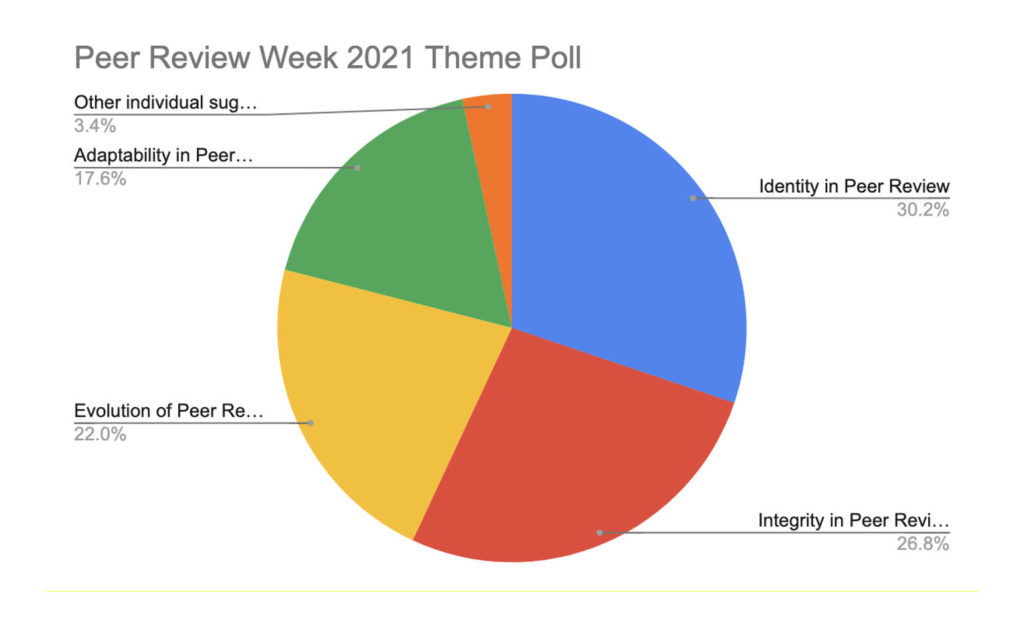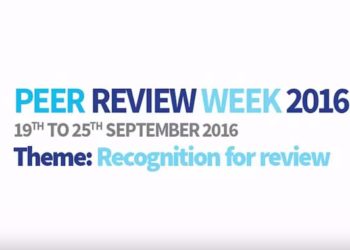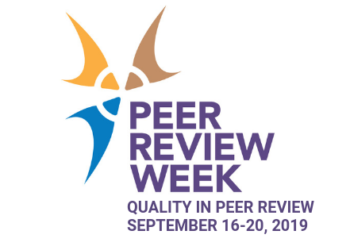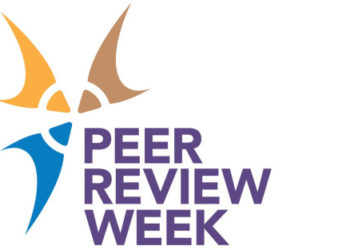Editor’s note: Today’s guest post is by the Co-Chairs of this year’s Peer Review Week Steering Group. Danielle Padula is Marketing and Community Development Manager at Scholastica and Jayashree Rajagopalan is Senior Manager of Global Community Engagement at CACTUS.
The community has spoken and officially chosen the theme for Peer Review Week 2021 via an open global survey. Drumroll, please…
Peer Review Week, September 20-24, a yearly global event celebrating the essential role peer review plays in maintaining research quality, will this year center on the topic “Identity in Peer Review.” Throughout the week, participating organizations will host virtual events and activities exploring the multifaceted nature of identity; how personal and social identity influences peer review practices and experiences; and what’s needed to foster more diverse, equitable, and inclusive peer review processes.

The 2021 Peer Review Week theme is the first to be selected by a community vote. The theme survey, which ran April 27 – June 7, 2021, received a total of 381 responses, with “Identity in Peer Review” emerging as the most popular choice, closely followed by “Integrity” and “Evolution.” On behalf of the entire Peer Review Week steering committee, we want to thank everyone who contributed theme ideas and completed the survey — this has truly been a group effort!
Now is a particularly apt time to foster discussions about “Identity in Peer Review,” with various critical social change movements coming to the fore in all areas of academia as well as the mainstream zeitgeist. Over the past 18 months alone, pressing global challenges from systemic racism to the climate crisis to health equity are increasingly important components of scholarly and public discourse, catalyzed by the COVID-19 pandemic. Inherent to these movements are questions of identity — for individuals, organizations, and entire cultures. The onus is on all scholarly stakeholders, especially those involved in peer review in all its forms, to help facilitate these conversations through our outputs and actions. This Peer Review Week will be an opportunity to delve into ongoing identity-related discussions and initiatives and kick off new ones.
Peer Review Week Preview: Unpacking the many facets of “identity”
In many ways, the role of “Identity in Peer Review” is a vital precursor to the two Peer Review Week theme poll runner-up topics — “Integrity” and “Evolution”. The ways in which different aspects of identity are acknowledged or omitted from peer review help determine its integrity. And the ways in which the scholarly community handles matters of identity and integrity in peer review directly influence the trajectory of peer review — how it is done, who it is done by, how they are recognized, and more . The “Identity” theme also provides an opportunity to revisit aspects of past Peer Review Week discussions, including:
Diversity, Equity and Inclusion (DEI) in peer review: Is peer review truly representative? Whose voices are left out or stifled, and what can scholars and organizations do to change that? The research community is grappling with these questions, with reports like the “Workplace Equity Survey” and the latest National Center for Education statistics revealing stark racial and gender disparities in academia. Unpacking the many facets of “identity” that determine and impact individuals’ sense of self and community is integral to understanding how different individuals and groups experience the research ecosystem and taking steps to make it more diverse, equitable, and inclusive. This Peer Review Week is an opportunity to explore the meaning and implications of different identities and, in turn, identify ways to encourage varied perspectives in scholarship, lift marginalized voices, and promote healthier discourse. DEI initiatives also spur scholarly collaboration across cultures and disciplines essential to solving the world’s biggest challenges.
Approaches to peer review blindness and author identification: As we work to foster DEI in research, there are also complex questions to consider around if, when, and how to reveal scholars’ identities during or after peer review. Blinded peer review, and particularly the extent to which it supports or precludes diverse perspectives, is a topic that warrants more widespread discussion. There are compelling arguments in favor of varying levels of open peer review to promote transparency and accountability. On the flip side, many assert that (single, double, or even triple) blinded peer review is essential to curbing implicit biases and ensuring free participation, unhindered by direct or indirect reviewer pressures from scholars in positions of power. We hope these conversations will continue this Peer Review Week. Additionally, there are many aspects of author identity to consider, including how journals can better track and communicate changes in authors’ names, gender orientations, locations, institutional affiliations, and more, for example, via persistent identifiers (PIDs). We hope that, by introducing discussions around the identities of peer review stakeholders, this Peer Review Week will foster an increased awareness of and sensitivity to how different layers of identity subconsciously influence peer review approaches, participation, and responses.
How scholarship is made available to the public before and after peer review: The topic of “Identity in Peer Review” can also be extended to public perceptions of scholarship and the extent to which different groups and individuals identify themselves as having trust in research and scholarly publications. A primary question for scholars and publishers to consider around encouraging public trust in science is if and how to distinguish unvetted research outputs from peer-reviewed ones. This topic has become particularly pressing with the rise of preprints, with more scholars posting work to preprint servers before, during, and after peer review. Preprint posting is a powerful way to speed up and expand access to research, as exemplified during the pandemic. But there are concerns that preprints could also feed distrust in science if flawed papers enter the mainstream without being “identified” as unvetted — particularly in the media.
Understanding identity through experiences: Another aspect of identity in peer review that we plan to highlight this year is experience sharing. To foster increased awareness and understanding of identity, we encourage everyone in academia and scholarly communications to share their peer review stories — What was YOUR experience of peer review? How did YOU feel/react/respond (e.g., as an author, reviewer, or editor)? Given that the community chose this year’s theme, we invite the community, once again, to talk about why “Identity in Peer Review” matters to them. This experiential exchange will, we hope, help unravel some of the complexities around the influence of identity in peer review. More importantly, we hope that these experiences will also serve as one of the guiding forces behind essential and informed changes to foster DEI in peer review.
These are just a few possible takes on “Identity in Peer Review” — looking ahead to Peer Review Week, we’re excited to see the many directions in which participants take this year’s theme!
Participating in Peer Review Week
As we initiate preparations for Peer Review Week, we invite individuals and organizations interested in getting involved to join the steering committee, which currently consists of 65+ individuals from 35+ organizations, including scholarly societies, university libraries, publishers, vendors, funders, and more. Please email the co-chairs to learn more: Jayashree Rajagopalan of Cactus Communications (jayashreer@cactusglobal.com) and Danielle Padula of Scholastica (dpadula@scholasticahq.com).
We also invite everyone interested to please mark your calendars for Peer Review Week 2021, September 20-24, and start thinking about how you and your organization can take part in this year’s events! For inspiration and to learn more, please visit the official (and newly redesigned!) Peer Review Week website. We’d love to add your planned event(s) to the community listing (we welcome webinars, blog posts, live panels, and more!), and we look forward to an informative and action-packed Peer Review Week 2021!


Discussion
2 Thoughts on "Guest Post — The Votes Are In! Announcing This Year’s Peer Review Week Theme"
OK I as mdumiseni I’m looking forward to learn and be a member of community and make sure I don’t left behind to any event good luck to those who are chosen, for peer review week, honestly I don’t have to much to say I’m looking forward to learn more and more.
Identity in peer review has become an important issue that define the quality of submitted work. I’m looking forward to discussion on it as we.move into new era in open Access peer review



